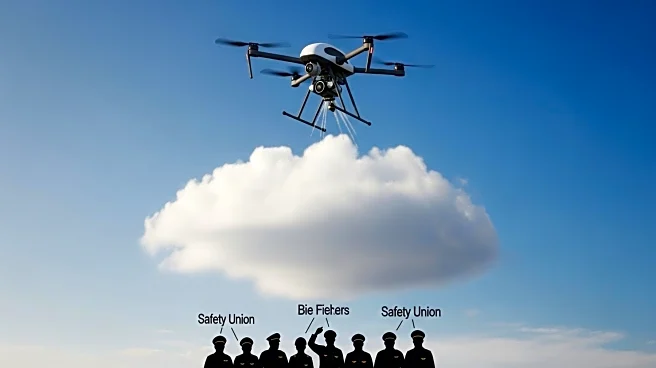What's Happening?
Rainmaker Technology's proposal to use drones for cloud-seeding operations is facing opposition from the Air Line Pilots Association (ALPA). The union has urged the Federal Aviation Administration (FAA) to deny Rainmaker's request unless it adheres to stricter safety guidelines. Rainmaker seeks an exemption from regulations that prohibit small drones from carrying hazardous materials, intending to use drones equipped with flares to induce precipitation. The FAA has not yet ruled on the request but has asked for more detailed information on the safety and operational aspects of the proposal. ALPA has raised concerns about the safety risks posed by the drones, particularly regarding the potential for foreign object debris and fire hazards. The union also criticized the lack of clarity in Rainmaker's filing about flight locations and altitudes, as well as the environmental impact of the chemical agents used.
Why It's Important?
The outcome of this proposal could significantly impact the future of weather modification technologies in the U.S. If approved, Rainmaker's drone-based approach could offer a more cost-effective and potentially safer alternative to traditional manned cloud-seeding flights. This could benefit industries reliant on weather modification, such as agriculture and water management. However, the safety and environmental concerns raised by ALPA highlight the need for rigorous regulatory oversight. The FAA's decision will set a precedent for how emerging technologies in weather modification are regulated, balancing innovation with public safety and environmental protection.
What's Next?
The FAA's decision on Rainmaker's proposal will be pivotal. If the agency finds the safety measures sufficient, it could pave the way for broader adoption of drone-based cloud-seeding. Conversely, a rejection could prompt Rainmaker to revise its safety protocols or explore alternative methods. The decision will likely influence other startups in the weather modification sector, potentially affecting investment and development in this field. Stakeholders, including environmental groups and industries dependent on weather modification, will be closely monitoring the FAA's ruling.
Beyond the Headlines
The debate over Rainmaker's proposal underscores broader ethical and environmental considerations in geoengineering. The use of drones for cloud-seeding raises questions about the long-term ecological impacts and the potential for unintended consequences. As climate change intensifies, the demand for innovative weather modification solutions will grow, necessitating a careful balance between technological advancement and environmental stewardship.










